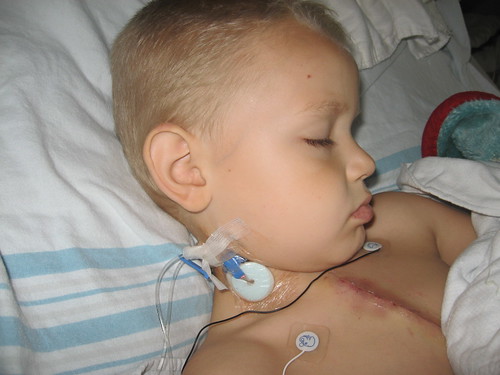"One Day"
Did you know that every year the week before Valentine's Day is Congenital Heart Defect (CHD) Awareness week?

Did you know that CHDs account for 24% of infant deaths due to birth defects?
Or that every year in the U.S. about 4,800 (or 11.6 per 10,000) babies born every year have one of seven critical congenital heart defects (CCHDs)?
Did you also know that there is a simple, non-invasive test, called the "Pulse Ox" (pulse-oximetry screening) test that can detect a CCHD in the hospital before a new baby is released?
I didn't either!
The Pulse-Ox test is as non-invasive as the hearing test done on all newborns, a test that is standard, yet the pulse-ox test is not, though it could potentially prevent many newborns from going home with a CCHD undetected. Painless sensors are placed on the baby's skin and pulse rate and oxygen levels are tested. It takes just a few minutes, the baby does not even need to leave your room and is done when the baby is one day old (generally most women stay 24 hrs or more postpartum, so no need to stay longer than already planned).
Now, generally, I believe that there are a lot of things done unnecessarily in the name of science and medical testing. I'm not one to blindly jump on the bandwagon of MORE testing! But because this is a non-invasive diagnostic tool, I support it.
Sure, it may not be a perfect tool for diagnosing a CCHD, it will miss some infants who have a CCHD and it will throw up red flags on infants who don't, but used in conjunction with a standard newborn exam, it may help some of the almost 300 babies and their families who are unknowingly sent home every year with a CCHD.
8 years ago our son was born with a Congenital Heart Defect (CHD) - Coarctation of the Aorta. It was missed when he was born and we went 3 1/2 years without knowing it. It was not one of the 7 Critical Congenital Heart Defects (CCHD) that are potentially detected by the Pulse-Ox test, but just as deadly in the long-term. He would not have survived past early adulthood, and there is nothing worse than realizing your child has been living in a seriously life-threatening state for years without anyone knowing it.
Three states have so far passed legislation concerning mandatory Pulse-Ox screening. While I may not agree on the "mandatory" part, that does seem to be the only way most people will learn about the test and what it provides. Of course, as in all testings and screenings performed, you would still have the right to refuse it by signing forms prior to the birth at the hospital.
Some of you might not think all the disclaimers sound like me supporting it, but really, I do! I just also happen to support taking charge and full responsibility for your birth choices and what is/is not done to your baby.
So if you are inclined, you can go here and find a link to email someone in your state to get involved with this cause.
Here in our home, this is the face of CHD:

And I am so glad and thankful to God that it did not go another day without being diagnosed. Not. One. Day.

*Statistical information gathered from the CDC.

1 comment:
I will never be able to look at his hospital pictures without tearing up. Never. I am so thankful that that day was. And even more thankful that it is over.
Post a Comment